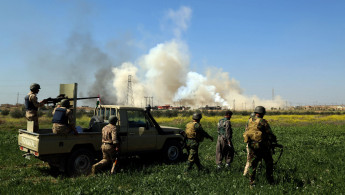US defence chief Carter in Iraqi Kurdistan for talks
US Defence Secretary Ashton Carter is meeting with Iraqi Kurdish leaders for talks about the Kurdish role in fighting the Islamic State group in Iraq.
2 min read
The US is helping train Kurdish Peshmerga forces in battles against IS fighters [Getty]
US Defence Secretary Ashton Carter is meeting with Iraqi Kurdish leaders in the Kurdish capital city of Erbil on Friday, to give him new insights into how the Kurds have managed to preserve an effective force in the face of the Islamic State group (IS, formerly ISIS) battlefield pressure.
Accompanied by some of the US troops stationed in the northern autonomous region of Iraqi Kurdistan, Carter arrived on a military flight from Amman, Jordan, where he had spent the night after holding meetings and giving a pep talk to US troops in Baghdad on Thursday.
In Erbil, Carter is meeting with Masoud Barzani, president of the Kurdish regional government, and other Kurdish government and military officials.
The US is helping train and equip Kurdish armed forces, known as the Peshmerga, in battles against IS fighters.
The Kurdish forces, generally more experienced and more effective on the battlefield than their counterparts in the Iraqi army, have played a vital role in containing IS in northeastern Iraq.
They hold mostly defensive positions across large parts of northern Iraq and would be expected to play a key role in an eventual Iraq campaign to retake Mosul, which fell to IS in June 2014.
The US military works closely with the Kurds, providing arms, training and advice. The Obama administration has resisted calls by some in Congress to bypass the Iraqi government in Baghdad and provide weapons directly to the Kurds. The administration instead has sent arms through the central government, reasoning that this preserves the hope of avoiding a final division of the country into sectarian and ethnic enclaves.
IS's takeover of much of northern Iraq last year, including the city of Mosul, triggered a Kurdish push south and west to take control of the disputed city of Kirkuk, which is key to Iraq's northern oil fields.
After his Erbil visit, Carter will return to Washington, concluding a weeklong Middle East tour that started Sunday in Israel and included visits to Jeddah, Saudi Arabia, and Amman, Jordan.
It was Carter's first visit to Iraq since he took office in February.
Accompanied by some of the US troops stationed in the northern autonomous region of Iraqi Kurdistan, Carter arrived on a military flight from Amman, Jordan, where he had spent the night after holding meetings and giving a pep talk to US troops in Baghdad on Thursday.
In Erbil, Carter is meeting with Masoud Barzani, president of the Kurdish regional government, and other Kurdish government and military officials.
The US is helping train and equip Kurdish armed forces, known as the Peshmerga, in battles against IS fighters.
The Kurdish forces, generally more experienced and more effective on the battlefield than their counterparts in the Iraqi army, have played a vital role in containing IS in northeastern Iraq.
They hold mostly defensive positions across large parts of northern Iraq and would be expected to play a key role in an eventual Iraq campaign to retake Mosul, which fell to IS in June 2014.
The US military works closely with the Kurds, providing arms, training and advice. The Obama administration has resisted calls by some in Congress to bypass the Iraqi government in Baghdad and provide weapons directly to the Kurds. The administration instead has sent arms through the central government, reasoning that this preserves the hope of avoiding a final division of the country into sectarian and ethnic enclaves.
IS's takeover of much of northern Iraq last year, including the city of Mosul, triggered a Kurdish push south and west to take control of the disputed city of Kirkuk, which is key to Iraq's northern oil fields.
After his Erbil visit, Carter will return to Washington, concluding a weeklong Middle East tour that started Sunday in Israel and included visits to Jeddah, Saudi Arabia, and Amman, Jordan.
It was Carter's first visit to Iraq since he took office in February.




 Follow the Middle East's top stories in English at The New Arab on Google News
Follow the Middle East's top stories in English at The New Arab on Google News


![A group of Palestinians, foreign and Israeli activists gather to participated in an olive picking event on the land in the town of Battir, which is under threat of confiscation by Israel in Bethlehem, occupied West Bank on 8 November 2024. [Getty]](/sites/default/files/styles/image_330x185/public/2182930803.jpeg?h=199d8c1f&itok=__0LgGsa)